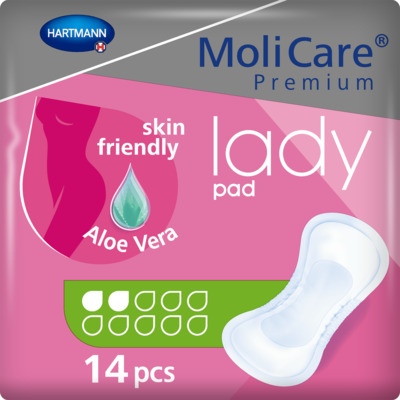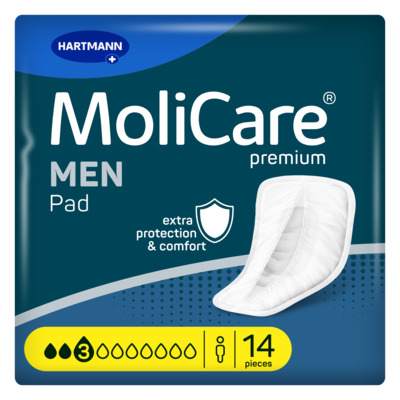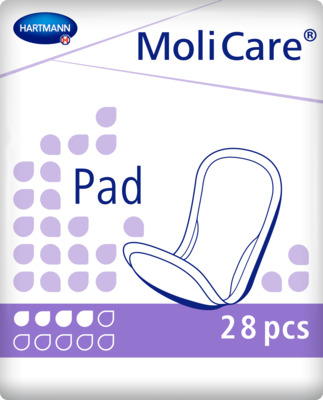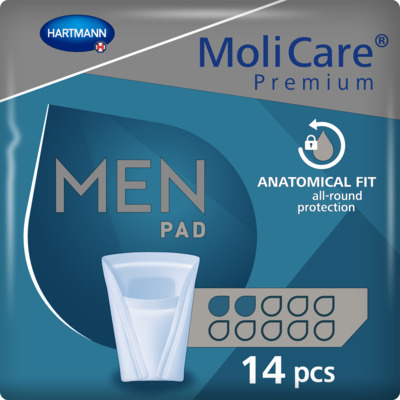Incontinence Advice
Relieving Latchkey Incontinence: Tips for a Better Lifestyle
Often overlooked, latchkey incontinence is a form of urge incontinence that often strikes upon arriving home. This sudden and intense need to urinate can disrupt daily life and diminish quality of life. In this article, we will explore the various causes of this condition - from neurological conditions to lifestyle factors—and discuss effective treatments such as pelvic floor exercises and bladder training techniques for latchkey incontinence. Whether you have been dealing with this issue for a long time or are newly experiencing symptoms, understanding and addressing latchkey incontinence can lead to significant improvements in comfort and confidence. Newsletter subscription - HARTMANN Direct ‘Latchkey incontinence’ is a non-clinical term for a form of urge incontinence. The condition is linked to conditioned responses and psychological factors. Latchkey refers to the desire to urinate when inserting a key into a door.Need to know facts about latchkey incontinence

What is latchkey incontinence?
Latchkey incontinence, a specific symptom of urge incontinence, is characterised by a sudden and intense need to urinate that occurs when one arrives home and inserts a key into the door. In urge incontinence, the signals between your bladder, nerves and brain get mixed up and the bladder contracts when it shouldn’t. This can lead to involuntary leaks and a sudden, intense urge to pass urine. It can significantly disrupt daily life.
Suitable for any form of incontinence, ourincontinence products can help you handle everyday situations comfortably. Browse our site to find out more.
Symptoms of latchkey incontinence
The main symptom of latchkey incontinence is the overwhelming urge to urinate as you approach or enter your home. However, as latchkey incontinence is a form of urge incontinence, other symptoms may include:
Frequency: Individuals may need to urinate more often than usual, sometimes exceeding eight times within 24 hours.
Urgency at night: Nocturnal enuresis, or waking up multiple times at night to urinate, is a common symptom, affecting how much sleep you may get per night. If this is the case, use our incontinence bed sheets.
Leakage: The urgency can be so immediate and intense that it causes leakage before reaching the toilet.
Triggers: Certain sounds, like running water, the jingling of keys, or even rain, might prompt an immediate need to urinate.
Incomplete emptying: After urination, there may be a sensation that the bladder is not fully emptied, adding to discomfort and anxiety.
Learn about how many times a day you should wee and why this is an important indicator of overall health.
Causes of latchkey incontinence
Latchkey incontinence can be caused by conditions that affect the detrusor muscle in the bladder or the result of interrelated causes, such as:
Constipation and pressure: A full bowel exerts extra pressure on the bladder, intensifying the urge to urinate and contributing to incontinence.
Neurological conditions: Diseases such as Parkinson's disease and multiple sclerosis (MS) can damage bladder nerves, misdirecting the signals that control urination. Learn about the link between Parkinsons and incontinence for more information.
Medications: Certain medications, including diuretics, can aggravate bladder sensitivity and lead to episodes of incontinence.
Chronic UTIs: Recurrent urinary tract infections can irritate the bladder, causing frequent and urgent trips to the toilet.
Obesity: Excess weight can increase pressure on the bladder, exacerbating incontinence symptoms.
Lifestyle and dietary influences:
Alcohol and caffeine: Consuming these substances in excess can irritate the bladder and increase the frequency of urination.
Inadequate hydration: Not drinking enough water can also irritate the bladder and affect its capacity to hold urine.
Physiological changes:
Ageing: The natural ageing process can decrease bladder elasticity and capacity, making it more difficult to control urination.
Menopause: The hormonal changes during menopause can reduce the strength of the urinary tract, leading to increased incontinence during menopause.
Pregnancy and childbirth: These conditions can stretch and weaken pelvic floor muscles, impacting bladder control and causing a correlation between pregnancy and incontinence.
Additional factors:
Severe bladder or nerve injury: Any significant damage can disrupt normal bladder function and lead to urge incontinence.
Surgical procedures: Operations like prostatectomy can have lasting effects on urinary control.
The brain-bladder connection
If you often need to wait until you get home to pass urine, the brain can start associating your arrival home with the need to urinate, triggering the urge to go whether your bladder is full or not. It is not just the arrival home that can trigger this; for some people, situations such as running water or the noise of rain can also act as a trigger.
Understanding how your brain and bladder communicate is key to managing latchkey incontinence. The process starts with the kidneys filtering blood and gradually filling the bladder with urine. As the bladder fills and reaches—typically around 200ml—nerves send signals to the brain indicating that it is getting full.
Ideally, if it's not a convenient time to urinate, the brain will instruct the bladder’s muscles to retain more urine, preventing leaks. However, when these signals misfire due to the aforementioned issues, it can result in inappropriate contractions of the bladder at an inconvenient time, such as when you just reach your front door.

How to treat latchkey incontinence
Fortunately, treatments are available for latchkey incontinence, and implementing any or every one of the below methods will aid in alleviating the condition.
Breaking the habit using bladder training techniques
Bladder training is a behaviour therapy aimed at improving bladder control. This method teaches you to extend the time between urges and actual urination, strengthening bladder capacity and control.
This method alters the conditioned response that triggers the urge to urinate upon arriving home. Delaying urination by a few minutes after getting home gradually removes the association between getting home and emptying your bladder.
Activities such as preparing a meal, organising around the house, or watching a bit of television can distract you and help extend the time between arriving home and using the toilet. Using a toilet before you head home can also remove the association between arriving home and using the toilet.
Strengthening the pelvic floor muscles
Pelvic floor exercises, such as Kegel exercises (available for men and women), are instrumental in strengthening the pelvic floor muscles that support the bladder. Regularly performing these exercises can significantly improve bladder control, reducing the urgency of the symptoms.
Do not let abnormalities with the bladder or bowels prevent you from participating in sports with incontinence.
Psychological treatments
Cognitive behavioural therapy (CBT) and mindfulness techniques have shown promise in managing this condition. CBT can help reframe thought patterns and reduce the anxiety linked to incontinence, while mindfulness enhances body awareness and stress reduction. Simply being aware of the brain-bladder link between turning the key and going to the toilet can help prevent this pattern. Integrating these therapies can improve bladder control and the overall quality of life for those affected by the condition.
Lifestyle and diet adjustments
Maintaining adequate hydration is essential; however, it's also wise to limit irritants like caffeine and alcohol that exacerbate bladder urgency. Consider the intake of natural supplements designed to support bladder health and function, such as those containing pumpkin seed and soy germ extracts, which have been shown to improve pelvic muscle tone and decrease urinary frequency.
Understanding foods and drinks that irritate the bladder and bowels, and bladder cleansing foods is worthwhile for a better diet.
Furthermore, having a Just Can’t Wait toilet card at hand for all social occasions is useful when you need to access a toilet in a hurry.
Consulting healthcare professionals
If you are struggling to manage latchkey incontinence, consult with a healthcare professional who can advise on a treatment plan tailored to fit your individual needs and conditions, ensuring the best approach to managing latchkey incontinence effectively.
Unable to control your bladder in public? You might be entitled to compensation - learn about whether bladder incontinence is considered a disability in the UK.

Relieving latchkey incontinence
Although often an underappreciated form of incontinence, latchkey incontinence can have a huge impact on the lives of people who experience it. Understanding how latchkey incontinence works is useful to understand what can trigger the sudden urge to urinate and how to treat it. For those struggling with persistent symptoms, consulting healthcare professionals for tailored treatments can be very effective. Embracing these treatments allows for better management of symptoms, restoring your confidence in everyday situations.
Find out whether you are unintentionally making one of these common bathroom mistakes so that you can improve your toiletry needs upon planning a trip again.
Further reading:
Want to learn more about incontinence in every scenario? Try these articles available from our blog:
Experiencing bladder leakages? Here, we answer the question of, why am I suddenly leaking urine?
Suffering from anxiety? Learn about how anxiety affects the bladder and bowels.
Have you recently had prostate surgery and are experiencing problems? Check out what happens with incontinence after prostate surgery.
FAQs
Is latchkey incontinence common?
Yes, latchkey incontinence is relatively common. It often occurs when individuals experience a strong urge to urinate that becomes uncontrollable as they approach or enter their home environment. This phenomenon is linked to conditioned responses and psychological factors.
Why can't I hold my pee when I get home?
The inability to hold your pee upon arriving home is linked to latchkey incontinence and is likely due to a conditioned psychological response. The mind associates arriving at home with the safety of using the toilet, which triggers the bladder to relax prematurely. Stress and the urgent desire to urinate intensify as you get closer to a toilet.
Sources
Bladder and Bowels. (2017) FREE Just Can’t Wait Toilet Card. [online] Available at: https://www.bladderandbowel.org/help-information/just-cant-wait-card/ [accessed 03/07/24]
Fowler, P., (2024) 5 Common Bathroom Mistakes You Might Be Making. Shape. [online] Available at: https://www.shape.com/lifestyle/mind-and-body/5-bathroom-mistakes-you-dont-know-youre-making [accessed 03/07/24]

MoliCare® Premium Lady Pad 2 Drops
<h2>Skin Friendly Pant Liners</h2> <p>For women that experience slight incontinence and bladder weakness, across different age groups, it can be a challenge to find the right bladder weakness product that is easy to apply and wear without the worry of potential leakages. Fortunately, we understand this approach, hence why we are happy to offer our MoliCare® Premium Lady Pad 2 drops, that is skin-friendly, Aloe Vera applied, and comes with 14 liners per bag.</p> <h2>Slim and discreet liners</h2> <p>Whether dealing with stress incontinence or urge incontinence, these panty liners offer a discreet and easy solution on the go. Simply place the pad in your underwear and secure it with the adhesive strip for all-round protection. Available in different absorbency levels, MoliCare® bladder weakness products cater to all levels of bladder weakness, ensuring secure care.</p> <h2>Control Bladder Weakness</h2> <p>Enjoy the benefits of these body-shaped absorbent panty liners, designed for women with bladder weakness. The pads offer discreet, reliable protection with features including odour control and fast absorption.</p> <p>With a wide adhesive strip, you can comfortably fix the pad in your regular underwear, providing secure and comfortable fixation. The pads are skin-friendly, featuring soft, breathable materials, including foam cuffs, and a top sheet treated with Aloe Vera.</p> <p>Keeping your skin healthy is a priority, which is why MoliCare® Premium Lady Pads have a skin-neutral pH value of 5.5 and an antibacterial finish. They are also dermatologically tested, offering peace of mind.</p> <h2>Buy pant liners online</h2> <p>Never worry about running out with our convenient order service and fast delivery direct to your door. Enjoy free shipping on orders over £50.</p> <p>If you need assistance, our professional customer service team is here to support you in choosing the right product. Reach out to us today at 0800 028 9470 and experience the comfort and reliability of MoliCare® Premium Lady Pads.</p>
MoliCare® Premium Men Pad 3 Drops (ISO 441ml)
<p><strong>Reliable and discreet incontinence pads for men with an instant-dry feeling</strong></p> <p>Bladder weakness is difficult to live with, the last thing you want to worry about is incontinence protection. That’s why our best-ever MoliCare® premium MEN Pad 3 drops offer an <strong>all-round protection</strong> that keeps everything dry and comfortably in place while fitting discreetly in your regular underwear.</p> <p>The incontinence pad for men quickly <strong>removes urine from the surface up to 86 %* faster than before</strong> and neutralises unpleasant odours to leave you feeling instantly dry and in control thanks to the new <strong>MoliCare SkinGuard</strong>®<strong> Absorbent Core Technology</strong>. This skin-friendly technology not only helps you feel up to 90 %* drier than previous MoliCare® premium<strong> </strong>MEN pads, it also helps to maintain healthy skin and preventing irritation.</p> <p><strong>Engineered for the male anatomy</strong> and dermatologically tested for maximum skin compatibility, these male urinary pads do not contain colour, perfume or latex making them environmentally friendly too.</p> <p>*Compared to last generation</p>
MoliCare® Pad 4 Drops
<h2>Handy MoliCare incontinence pads to carry on the go</h2> <p>Our MoliCare® Pad 4 Drops are an essential product for those experiencing slight incontinence, allowing you to regain control and live your busy and active life without the interference of bladder weakness. Designed for both men and women, this incontinence pad for men and women offers exceptional dryness and protection, ensuring your comfort and confidence.</p> <h2>‘Barely There’ Reassurance and Reliability</h2> <p>The MoliCare® Pad 4 Drops are slimline, discreet, and adjusted to fit your body seamlessly. It fixes securely inside your underwear, providing a ‘barely there’ comfort feel. With its soft and skin-kind fabric, along with a wide adhesive fixing strip on the backsheet, you can go about your day with the assurance of being protected against leakages.</p> <p>The absorbent core effectively prevents your skin from becoming too moist, while the elastic anti-leak edging adds an extra layer of security and peace of mind. Say goodbye to any worries about odours, as the MoliCare® Pad 4 Drops also neutralises odours to keep you fresh and confident throughout the day. Don't let incontinence hold you back from living life to the fullest.</p> <p>Ordering your MoliCare® Pad 4 Drops is hassle-free, as we offer fast delivery direct to your door. With our price match promise, you can trust that you're getting the best value for your money. Plus, enjoy free delivery on all orders over £50.</p> <p>If you need assistance in finding the perfect incontinence product for your needs, our friendly customer care team is here to help. Don't hesitate to reach out to us at 0800 028 9470. Take control of your life with the reliable protection and comfort of the MoliCare® Pad, alongside other <a href="https://www.hartmanndirect.co.uk/incontinence-products/incontinence-pads" style="color:#0563c1; text-decoration:underline">incontinence pads</a>.</p>
